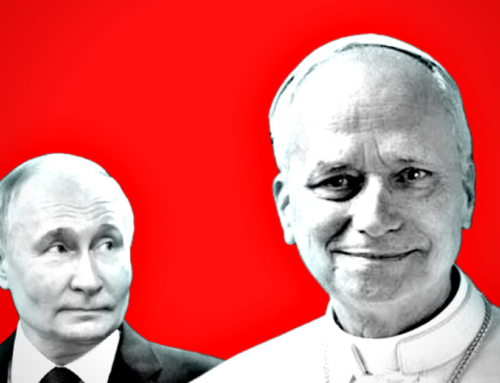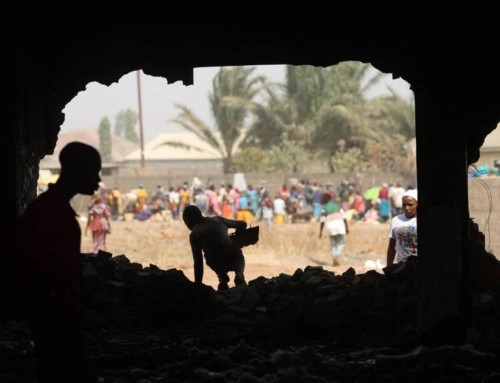
The vast African nation of Sudan is being tormented by civil war and famine, imposed by Islamist dictators who persecute Christians. More than 90% of the industry in Khartoum has been destroyed, and more than 12 million Sudanese have been displaced. Millions fled to Egypt, Eritrea, Ethiopia, Chad, DRC and South Sudan. But the majority remain trapped inside Sudan, facing not only daily barrages of artillery shelling and aerial bombing, sniper fire, abductions, and incarcerations, but also shortages of food, medicine, water, and shelter.
Today, 24 million Sudanese face severe “food insecurity”– a fancy way of describing famine. In the isolated Nuba mountains of Southern Kordofan, more than four million ethnic Nubans have chosen to live in “rebel-administered” territories where there is religious freedom. One million of these fled the war in Khartoum, where they experienced targeted persecution, terror, and abuse only to now face the threat of a slow death from starvation.
The UN estimates that as many as 100 children per day are dying in Sudan from starvation. I believe these numbers are grossly underestimated because, in the Nuba mountains alone, the local administration has reported more than 70,000 hunger-related deaths this year. USAID recently labeled the situation in Sudan as the world’s worst humanitarian crisis. The images of destruction, death and famine coming from Sudan are as horrific as one can imagine.
Tragically, the foreign policy Swamp in Washington, D.C., has kept the U.S. not just neutral, but actively friendly to the persecutors. That’s because the regime in Sudan has spent millions on K Street lobbying efforts since the Obama administration. So our State Department has bought the fiction that democratic “reform” has been underway in recent years. In fact, what we’ve seen is a jihadist regime turning the screws on its hapless people behind a fig leaf of “democratic transition.”
Donald Trump can change that, and score a genuine win for an America First foreign policy.
In 2016, Stream contributor Jason Jones exhorted President-Elect Donald Trump to warn Sudan’s Islamist dictator, Omar al Bashir, that his corrupt, blood-drenched regime would not get any support from the incoming administration.
Jones pointed to the extreme religious persecution in the North African country and Bashir’s links to the Muslim Brotherhood. Bashir was the architect of genocidal wars and terror within Sudan, and “managing director” of the biggest factory of political Islam exporting jihadists throughout the world than Saudi Arabia or Iran.
Sadly, the first Trump administration did not seize on this opportunity, but leaned on Obama-era careerists at the State Department. They removed Sudan from the “state sponsor of terror” list and it became eligible for loans, debt forgiveness, and foreign investment.
The Swamp Won Despite Trump
Let me give you a little history. For a decade, careerists at the State Department have promised the world that Sudan was embarked on democratic reforms and expanding religious freedom. No evidence ever emerged that this was true. The Islamist government continued to wage its campaigns of terror, genocide, and persecution against marginalized communities in Darfur, Blue Nile, Southern Kordofan, and other parts of Sudan. Destruction of churches, extrajudicial imprisonment, torture, and killing of pastors and dissidents continued unabated.
In December 2018, rising costs of bread and fuel sparked an intifada. Millions of Sudanese citizens, mostly women and students, went to the streets in protest, calling for an end to the Islamist system, inaugurating true democratic rule, and a formal separation of religion from the state.
After 30 years in power, dictator Omar al Bashir was finally overthrown on April 15, 2019 and replaced by his lieutenant, General Abdel Fattah Al Burhan.
Meet the New Boss, Same as the Old Boss
Burhan declared himself president and “caretaker of the democratic transition” under a NCP-led military junta called the Transitional Military Council (TMC). The old regime was rebranded and poured into new wineskins. Civilian resistance committees knew better, and kept up the pressure by again sending millions to the streets.
In response, the Central Reserve Police unit, in cooperation with the paramilitary Rapid Support Force (RSF), carried out a wave of brutal crackdowns, murdering tens of thousands of young protestors and dumping their bodies in the Nile. The international community was alarmed, but tragically once again failed to stand with the Street. A misplaced hope that the Islamist leopard could change his spots led to inaction at another critical moment in Sudan’s history.
Reaching for their old playbook, the Transitional Military Council rebranded itself again as the “Sovereign Military Council” and added a civilian component. But no real power was shared, and Burhan would remain in charge as president with his brutal acolyte, Mohamed Hamdan Dagalo, (a.k.a. Hemedti), serving as deputy.
Civilian representatives in the Sovereign Council were led by Prime Minister Abdallah Hamdok. But he quickly discovered he was only being used as a facade to legitimize the old order, and began to push back against the system.
Another Coup, Then a Civil War
On October 25, 2021, Burhan and Hemedti dissolved the Sovereign Council in a coup against the democratic transition. Hamdok and other key civilian members of the council were arrested and detained “for their own safety.” And again, international condemnation of the coup quickly evaporated as key stakeholders, including the United States, reasserted the de facto legitimacy of the military, led by Burhan and Hemedti.
But “the Street” persisted in their core demands, including the complete toppling of the Islamist system and the establishment of religious freedom and democratic civilian rule. Their cries for justice and more democracy – largely ignored by their natural allies in the West — were answered with more abuse, brutality, and bullets by the military. Systematic rape, extrajudicial arrests, torture and murder continued.
Following the coup, a rift developed between Burhan and Hemedti. On April 15, 2023, the dam finally burst when the forces of the two generals began fighting each other on the streets of the capital city of Khartoum. Far from stopping a civil war in Sudan by getting rid of the meddlesome civilians, Burhan and Hemedti started the worst civil war in Sudan’s history.
How Trump Can Score a Win for Both America and Sudan
Donald Trump likes to win. And he can get a big win for America and Sudan during his next administration. Trump’s historic electoral victory provides him with unique opportunities to fix failed policies at home and abroad. The same values and commitments pledged to end wars and save lives in the Middle East and Eastern Europe can be applied to Sudan, where the death toll is on a scale commensurate to Ukraine and Gaza. But will America place the same value on the lives of the Sudanese as we do people living in Ukraine and Gaza?
Sudan has been a missed opportunity for American policymakers for the last four decades. Ronald Reagan won the Cold War by replacing our failed “containment” strategy toward Communism with “Rollback.” The same winning strategy can be applied to our fight against radical Islamist terror.
President George W. Bush chiseled a crack in the wall of Islamist tyranny in Sudan with his support of the historic Comprehensive Peace Agreement (CPA) of 2005. Unfortunately, nearly 20 years on, the commitments enshrined in the CPA and guaranteed by the West remain unfulfilled.
Sudan’s Nuba people were promised self-determination and religious freedom. As Sudan’s largest indigenous group, the six million Nuba have been the biggest victims of Khartoum’s genocidal behavior. Today, 70% of Nuba live in Southern Kordofan State under the administration of the SPLM-N (Sudanese People’s Liberation Movement-North).
Under the SPLM-N, the Nuba people have created a level of stability and self-governance with religious freedom in a region the size of the American state of Georgia. Why isn’t America’s policy objective in Sudan supporting the pro-western Nuba people instead of continuing to legitimize the known Islamists who are oppressing them? Trump has an opportunity to renovate America’s foreign policy toward Sudan and elsewhere in Africa in ways that advance our national interests and values.
A MAGA Plan to Help the Persecuted
The new Trump administration would be smart to commit to the following:
Reassert our obligations to support self-determination and religious freedom in Sudan. Immediately recognize the legitimacy of the semi-autonomous and pro-democratic region of Southern Kordofan State under the SPLM-N.
End the Biden policy of giving legitimacy to the Islamist government at the neglect of the African majority within Sudan. These Islamist killers have no mandate or legitimacy to govern Sudan. Their history is stained with only blood, corruption, and terror.
Immediately demand open humanitarian access to all areas of Sudan, especially those not governed by Burhan and Hemedti, such as Southern Kordofan, Blue Nile, and parts of Darfur. Don’t ask permission from Islamists. Just do it.
Send a message to our allies in Egypt, Saudi, Emirates and elsewhere that their continued investment in this war will not be rewarded. If they want good relations with the new U.S. administration, they had better stop supporting the old one in Sudan.
Trump Can Win Here Too
The United States cannot and should not be the policeman of the world. But we do have a moral voice and a huge market. Both can be used to protect the just and punish the wicked. Before he even takes office, Donald Trump can use his electoral mandate to send a clear message to the Burhans and Hemedtis of the world: American resources will no longer be used to legitimize and resuscitate the failed states of our enemies.
Trump has already assembled an impressive team to begin the work of cleansing the “woke” from America’s government. Ambitious goals have been set to bring down energy costs, secure our border, rebuild the military, rein in Big Pharma, etc. Most important for those living outside the United States, Trump has promised to be a “peace president.” Peace. He pledged himself to end the destructive wars in Ukraine and Israel/Gaza– and I believe he will.
But I also believe Trump can win in Sudan by standing with our natural allies rather than America’s enemies.
The way to end Sudan’s conflict is roughly the same as all the others. It’s a matter of reaffirming our values. No troops. No treasure. Just America selecting our allies based on our values and interests, and not those of naive globalists or greedy transnational corporations.
If President Trump succeeds in bringing peace to Ukraine, Gaza, and Sudan, he will certainly win a Nobel Prize. But, unlike many of his predecessors, he will have actually earned it. If anyone can do it, Donald J. Trump can.
Brad Phillips is the founder and president of The Persecution Project, a faith-based charity which has been active in serving Sudan’s marginalized and persecuted communities for nearly 30 years.
The post Trump Can Win in Sudan appeared first on The Stream.
Subscribe Below To Our Weekly Newsletter of our Latest Videos and Receive a Discount Code For A FREE eBook from our eBook store:





